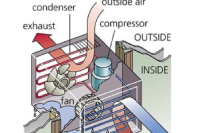With the summer heat upon us, making sure your air conditioning unit is functioning properly should be one of your top priorities.
Why does water form in your air conditioner?
Part of your air conditioner’s job is to suck in the humidity from the air. The inside of the air conditioner pulls in hot, humid air through the return griller and over the cold evaporator coil to cool the air down. When that happens, condensation begins to form on the evaporator coil. The water that lies on the evaporator coils falls into a sloped drain pan and down a condensate drain line. The drain line typically exits through the outside of the home or into your plumbing. If there is a problem with any one of these parts, you may notice water in your home.
How to prevent a leak in your air conditioning unit:
1. Check your condenser pump
Your condenser pump may be the cause of the leak in your AC unit. To check whether you have a broken pump, pour water into the condenser pan and test it.
2.Problem in the drain line
Problems in the drain line are often the most common cause of AC leaks. A clogged drain can form an obstruction in your AC unit. Once you clean the blockage, the leaking should stop.
3. Blocked vents
Blocked vents can lead to high pressure in your AC unit which can cause leakage. Make sure to examine your AC vent for any blockage and clear it up to prevent further damage.
4. Low refrigerant
Low refrigerant can lower the pressure in your AC system, causing the evaporator coil to freeze over. When the coil melts, water overflows into the drain pan. To see if you’re low on refrigerant check to see if you hear a hissing or bubbling noise.
Depending on the severity of the leak, you’ll need to either repair the cause of the leak or replace the whole AC unit. Make sure to follow these precautionary steps to prevent any damage from occurring in your home!
Contact us at 888-379-7970 for 24/7 emergency service!


Our Covered Cities
- Adelphia
- Allendale
- Allenhurst
- Allentown
- Allenwood
- Annandale
- Asbury
- Asbury Park
- Atlantic Highlands
- Avenel
- Avon By The Sea
- Baptistown
- Basking Ridge
- Bedminster
- Belford
- Belle Mead
- Belleville
- Belmar
- Berkeley Heights
- Bernardsville
- Blawenburg
- Bloomfield
- Bloomsbury
- Boonton
- Bound Brook
- Bradley Beach
- Brick
- Bridgewater
- Brielle
- Brookside
- Budd Lake
- Butler
- Caldwell
- Califon
- Carteret
- Cedar Grove
- Cedar Knolls
- Chatham
- Chester
- Clark
- Cliffwood
- Clinton
- Colonia
- Colts Neck
- Convent Station
- Cranbury
- Cranford
- Cream Ridge
- Dayton
- Deal
- Denville
- Dover
- Dunellen
- East Brunswick
- East Hanover
- East Orange
- Eatontown
- Edison
- Elizabeth
- Elizabethport
- Englishtown
- Essex Fells
- Fair Haven
- Fairfield
- Fanwood
- Far Hills
- Farmingdale
- Flagtown
- Flanders
- Flemington
- Florham Park
- Fords
- Fort Monmouth
- Franklin Park
- Freehold
- Frenchtown
- Garwood
- Gillette
- Gladstone
- Glen Gardner
- Glen Ridge
- Green Village
- Hampton
- Hazlet
- Helmetta
- Hibernia
- High Bridge
- Highland Park
- Highlands
- Hightstown
- Hillsborough
- Hillside
- Holmdel
- Hopewell
- Howell
- Imlaystown
- Ironia
- Irvington
- Iselin
- Island Heights
- Jackson
- Keansburg
- Keasbey
- Kendall Park
- Kenilworth
- Kenvil
- Keyport
- Kingston
- Lake Hiawatha
- Lake Hopatcong
- Lakehurst
- Lakewood
- Lambertville
- Landing
- Lavallette
- Lawrence Township
- Lebanon
- Ledgewood
- Leonardo
- Liberty Corner
- Lincoln Park
- Lincroft
- Linden
- Little Silver
- Little York
- Livingston
- Long Branch
- Long Valley
- Lyons
- Madison
- Manasquan
- Manchester Township
- Mantoloking
- Manville
- Maplewood
- Marlboro
- Martinsville
- Matawan
- Mendham
- Metuchen
- Middlesex
- Middletown
- Milford
- Millburn
- Millington
- Millstone Township
- Milltown
- Mine Hill
- Monmouth Beach
- Monmouth Junction
- Monroe Township
- Montclair
- Montville
- Morganville
- Morris Plains
- Morristown
- Mount Arlington
- Mount Freedom
- Mount Tabor
- Mountain Lakes
- Mountainside
- Navesink
- Neptune
- Neshanic Station
- Netcong
- New Brunswick
- New Egypt
- New Providence
- New Vernon
- Newark
- North Brunswick
- Nutley
- Oakhurst
- Ocean Grove
- Oceanport
- Old Bridge
- Oldwick
- Orange
- Oxford
- Parlin
- Parsippany
- Peapack
- Pennington
- Pequannock
- Perth Amboy
- Picatinny Arsenal
- Pine Brook
- Piscataway
- Pittstown
- Plainfield
- Plainsboro
- Pluckemin
- Point Pleasant Beach
- Pompton Plains
- Port Monmouth
- Port Reading
- Pottersville
- Princeton
- Princeton Junction
- Quakertown
- Rahway
- Randolph
- Raritan
- Readington
- Red Bank
- Ringoes
- Riverdale
- Rockaway
- Rocky Hill
- Roosevelt
- Roseland
- Roselle
- Roselle Park
- Rosemont
- Rumson
- Sayreville
- Schooleys Mountain
- Scotch Plains
- Sea Girt
- Seaside Heights
- Sergeantsville
- Sewaren
- Short Hills
- Shrewsbury
- Skillman
- Somerset
- Somerville
- South Amboy
- South Bound Brook
- South Orange
- South Plainfield
- South River
- Spotswood
- Spring Lake
- Springfield
- Stanton
- Stirling
- Stockton
- Succasunna
- Summit
- Tennent
- Three Bridges
- Titusville
- Toms River
- Towaco
- Trenton
- Union
- Vauxhall
- Verona
- Warren
- Washington
- Watchung
- West Long Branch
- West Orange
- West Windsor
- Westfield
- Wharton
- Whippany
- Whitehouse
- Whitehouse Station
- Wickatunk
- Windsor
- Woodbridge
- Wyckoff
- Wall Township
- Zarephath
Comments are closed.



